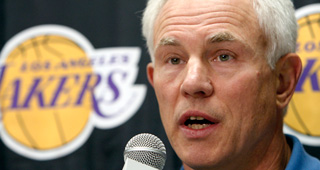As the Los Angeles Lakers head home for a Game 7 against the Denver Nuggets after squandering a 3-1 series lead, there’s plenty of blame to go around. Most of the focus has been on their three stars: Kobe Bryant, who still takes far too many contested shots, Pau Gasol, who is still not aggressive enough against smaller defenders and Andrew Bynum, whose been repeatedly beat down the floor by the Nuggets frontcourt.
However, while their salaries and media profile make them the natural scapegoats, the Lakers problems in this series aren’t the holes in their best players’ games. Their other perimeter players have not been able to knock down open jumpers, and there isn’t anything Bryant, Gasol, Bynum or Mike Brown can do about it.
Floor spacing is essential to an effective offense: the more spread out a defense is, the harder it is for them to send help when an offensive player beats his man. The NBA’s best offensive players can consistently beat an individual defender to create a good look at the basket, but not even Shaquille O'Neal could consistently beat double teams, which is why the Lakers played so many shooters (Robert Horry, Rick Fox, Derek Fisher) next to him.
When the Lakers were rolling to three consecutive championships, they presented defenses with an intractable dilemma: either let Shaq and Kobe play 1-on-1 against their defenders or leave excellent shooters wide open on double-teams. There’s a reason Horry won seven championships: he was the perfect complement to a dominant low-post scorer, an excellent 6’10 defender who shot 34% from beyond the arc for his career.
In contrast, none of their current role players have been able to make the Nuggets pay for leaving them wide open from the perimeter. Ramon Sessions, a point guard more suited for an uptempo pick-and-roll offense, has shot 23% from three in the playoffs. Matt Barnes is at 12% while Devin Ebanks has yet to make a single three-pointer. Steve Blake, who has never been known as a lights-out shooter, has been the team's only three-point threat in the series at 37%.
An NBA playoff series is all about adjustments, and Denver coach George Karl has made two excellent ones to keep his team alive: increasing JaVale McGee’s minutes and daring the Lakers to hit perimeter jumpers by packing in his defense. Gasol (1-10) and Bynum (4-11) put up horrible stat-lines in Game 6, but there isn’t all that much a post scorer can do when there is a second defender sitting in his lap. Los Angeles is dangerous because they have the size to command double teams in the post, but that advantage is negated when they can’t hit wide open jumpers.
The lack of respect Denver has shown for the Lakers role players has become almost embarrassing. In Game 6, the Nuggets weren’t defending Sessions, Barnes or Ebanks, leaving them wide open and forcing turnovers because there was nowhere for them to pass the ball.
Brown has been widely knocked for his coaching ability, especially on the offensive end, but his ability to make adjustments is dictated by the personnel he has available to him. Bynum, his most dangerous scorer, has been rendered ineffective by the Nuggets' constant double-teaming, and if the Lakers are going to win in Game 7, they’re going to need to make Denver pay for crowding the paint.
Of course, one adjustment that will be available is the artist formerly known as Ron Artest, who is returning from a seven-game suspension. However, Metta World Peace has never been a great perimeter shooter either, and he’s shooting only 29% from beyond the arc this season.
And even if Los Angeles can get past Denver in the first round, Karl has provided the blueprint to beat them. To make a deep playoff run, the Lakers will need some combination of Blake, Sessions, Barnes, World Peace and Ebanks to consistently make three-pointers, and the percentages indicate that isn’t very likely to happen.
Whenever the Lakers lose, there will be a circular firing squad of finger-pointing, most of it directed at their three stars. However, their problems on the perimeter have been obvious since their loss to the Mavericks last season, and their front office was never able to address them.
At this point in his career, Kobe is essentially a 6’6 post scorer, as he took only 12% of his shots in the lane this season. Without the ability to get to the rim on penetration, he has turned himself into a deadly back-to-the-basket player who shoots over the top of smaller defenders. However, like Bynum and Gasol, he no longer has the speed to split double teams, which means LA has to have two shooters on the floor to protect their three stars.
That could be trouble for Sessions, a free agent at the end of the season, as his poor outside shot makes him fairly ineffective in the half-court. Bynum, Gasol and Kobe don’t need a point guard who can get them easy shots; they need a point guard who can give them room to score by occupying a defender 25 feet away from the basket.
There is room to criticize all three players for how they approach the game, but they aren’t the main reason why LA has struggled against Denver. The Lakers still have the talent to be a title contender, but they will continue flaming out in the playoffs until they address their perimeter shooting.

Jonathan Tjarks wrote on the NBA for RealGM from 2011-2016 before joining The Ringer.
Follow @JonathanTjarks on Twitter.


